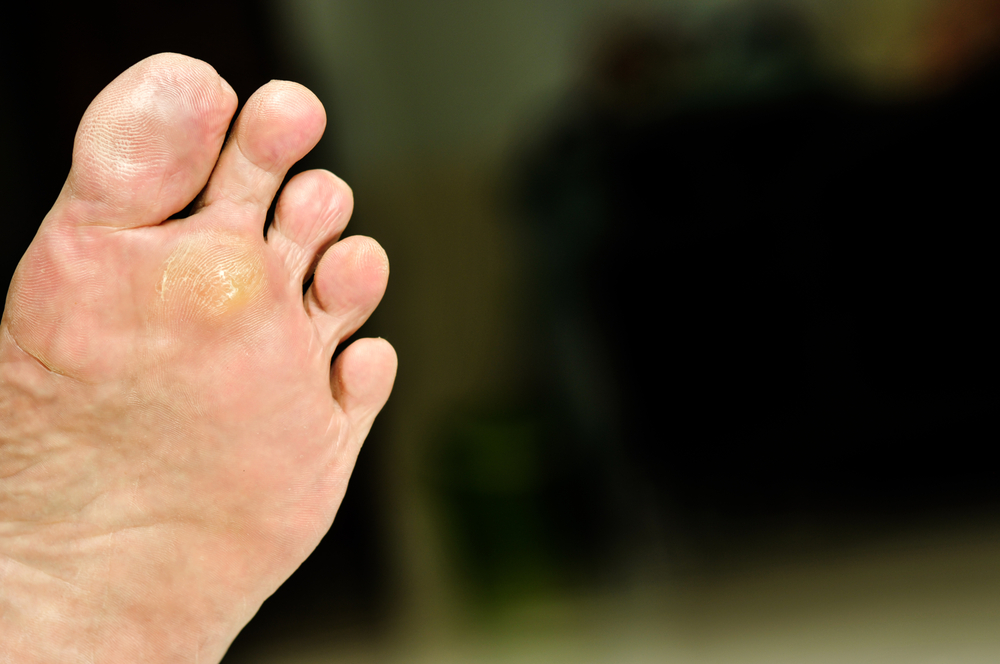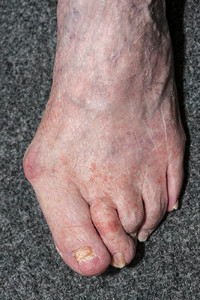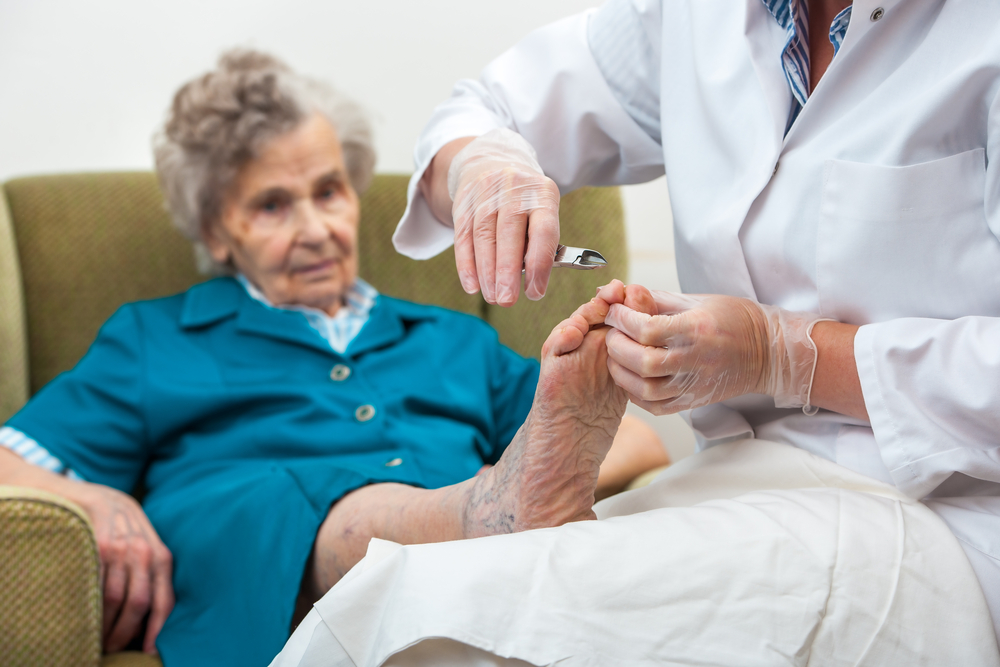Manalapan
(732) 845-0100
Manalapan (732) 845-0100
 The purpose of sweating is to regulate the body’s temperature. When this happens excessively, it’s known as hyperhidrosis. Most of the millions of people affected by this condition often feel a loss of control because sweating can occur independent of physical exertion. It may begin in childhood and is thought to be a genetically inherited condition. In severe cases, sweat can drip from the feet, possibly causing social situations to be uncomfortable. Anxiety, depression, infections and skin irritations may occur, resulting in difficulty in handling this condition psychologically. Typically, it helps to identify specific conditions that lead to excessive sweating. To reduce discomfort, keeping the feet dry is advised. Medications and surgery are possible treatment options to regulate this disorder. Please consult with a podiatrist if you have questions about excessive sweating from the feet.
The purpose of sweating is to regulate the body’s temperature. When this happens excessively, it’s known as hyperhidrosis. Most of the millions of people affected by this condition often feel a loss of control because sweating can occur independent of physical exertion. It may begin in childhood and is thought to be a genetically inherited condition. In severe cases, sweat can drip from the feet, possibly causing social situations to be uncomfortable. Anxiety, depression, infections and skin irritations may occur, resulting in difficulty in handling this condition psychologically. Typically, it helps to identify specific conditions that lead to excessive sweating. To reduce discomfort, keeping the feet dry is advised. Medications and surgery are possible treatment options to regulate this disorder. Please consult with a podiatrist if you have questions about excessive sweating from the feet.
If you are suffering from hyperhidrosis contact Dr. Charles Marchese of Manalapan Foot & Ankle. Our doctor can provide the care you need to attend to all of your foot and ankle needs.
Hyperhidrosis of the Feet
Hyperhidrosis is a rare disorder that can cause people to have excessive sweating of their feet. This can usually occur all on its own without rigorous activity involved. People who suffer from hyperhidrosis may also experience sweaty palms.
Although it is said that sweating is a healthy process meant to cool down the body temperature and to maintain a proper internal temperature, hyperhidrosis may prove to be a huge hindrance on a person’s everyday life.
Plantar hyperhidrosis is considered to be the main form of hyperhidrosis. Secondary hyperhidrosis can refer to sweating that occurs in areas other than the feet or hands and armpits. Often this may be a sign of it being related to another medical condition such as menopause, hyperthyroidism and even Parkinson’s disease.
In order to alleviate this condition, it is important to see your doctor so that they may prescribe the necessary medications so that you can begin to live a normal life again. If this is left untreated, it is said that it will persist throughout an individual’s life.
A last resort approach would be surgery, but it is best to speak with your doctor to find out what may be the best treatment for you.
If you have any questions please feel free to contact our office located in Manalapan, NJ . We offer the newest diagnostic and treatment technologies for all your foot and ankle needs.
 While the exact cause of bunions is unknown, there are things that can exacerbate them. These may include improper footwear, such as pointed shoes, high heels, and shoes that are too narrow across the bottom of the toes. Since the toe typically bears most of the body’s weight, poor footwear can lead to increased wear and tear; this can increase the severity of bunions. Additionally, genetics may play a role because foot structure and shape are hereditary. It’s also common for bunions to become more pronounced for those whose occupations consist of standing or walking. Treatments can include adding padding in the shoes for protection, wearing a shoe with a flexible sole for support, and possibly stretching your shoes to make room for the bunion. If you think you have a bunion, it is recommended to consult a podiatrist for a proper evaluation.
While the exact cause of bunions is unknown, there are things that can exacerbate them. These may include improper footwear, such as pointed shoes, high heels, and shoes that are too narrow across the bottom of the toes. Since the toe typically bears most of the body’s weight, poor footwear can lead to increased wear and tear; this can increase the severity of bunions. Additionally, genetics may play a role because foot structure and shape are hereditary. It’s also common for bunions to become more pronounced for those whose occupations consist of standing or walking. Treatments can include adding padding in the shoes for protection, wearing a shoe with a flexible sole for support, and possibly stretching your shoes to make room for the bunion. If you think you have a bunion, it is recommended to consult a podiatrist for a proper evaluation.
If you are suffering from bunions, contact Dr. Charles Marchese of Manalapan Foot & Ankle. Our doctor can provide the care you need to keep you pain-free and on your feet.
What Is a Bunion?
A bunion is formed of swollen tissue or an enlargement of boney growth, usually located at the base joint of the toe that connects to the foot. The swelling occurs due to the bones in the big toe shifting inward, which impacts the other toes of the foot. This causes the area around the base of the big toe to become inflamed and painful.
Why Do Bunions Form?
Genetics – Susceptibility to bunions are often hereditary
Stress on the feet – Poorly fitted and uncomfortable footwear that places stress on feet, such as heels, can worsen existing bunions
How Are Bunions Diagnosed?
Doctors often perform two tests – blood tests and x-rays – when trying to diagnose bunions, especially in the early stages of development. Blood tests help determine if the foot pain is being caused by something else, such as arthritis, while x-rays provide a clear picture of your bone structure to your doctor.
How Are Bunions Treated?
If you have any questions, please feel free to contact our office located in Manalapan, NJ . We offer the newest diagnostic and treatment technologies for all your foot care needs.
When there is an imbalance in the size of the nail and the enlargement of the skin edge, this may cause an ingrown toenail. Reasons for this may include the nail naturally growing inward, improper shoe fitting, and hereditary conditions. Other causes may be from an improper pedicure and/or poor foot hygiene. Common symptoms can be tenderness of the nail, swelling and redness. Additionally, drainage and pus may occur if there is an infection involved. Home remedies may include soaking the affected toe in lukewarm water, or applying antibacterial ointments for bacterial infections and antifungal ointments for fungal infections. Those who have diabetes or poor circulation are advised to consult a podiatrist even if the symptoms appear to be mild.
Ingrown toenails can become painful if they are not treated properly. For more information about ingrown toenails, contact Dr. Charles Marchese of Manalapan Foot & Ankle. Our doctor can provide the care you need to keep you pain-free and on your feet.
Ingrown Toenails
Ingrown toenails occur when a toenail grows sideways into the bed of the nail, causing pain, swelling, and possibly infection.
Causes
Prevention
Because ingrown toenails are not something found outside of shoe-wearing cultures, going barefoot as often as possible will decrease the likeliness of developing ingrown toenails. Wearing proper fitting shoes and using proper cutting techniques will also help decrease your risk of developing ingrown toenails.
Treatment
Ingrown toenails are a very treatable foot condition. In minor cases, soaking the affected area in salt or antibacterial soaps will not only help with the ingrown nail itself, but also help prevent any infections from occurring. In more severe cases, surgery is an option. In either case, speaking to your podiatrist about this condition will help you get a better understanding of specific treatment options that are right for you.
If you have any questions please feel free to contact our office located in Manalapan, NJ . We offer the newest diagnostic and treatment technologies for all your foot and ankle needs.
 Geriatric (elderly) people may be prone to foot problems, which may include ingrown toenails, corns, and calluses. A reason for this may be their inability to cut their own toenails due to poor eyesight or loss of mobility. A qualified caregiver should be able to cut toenails properly. Ideally, toenails should be kept short, as more problems tend to arise if the nails are too long. The shorter they are, the less risk there is of breaking a nail. As we age, it’s beneficial to stay healthy and active. However, it’s important to remember to practice proper foot care. A podiatrist should be consulted to learn the best options for correct maintenance and treatments.
Geriatric (elderly) people may be prone to foot problems, which may include ingrown toenails, corns, and calluses. A reason for this may be their inability to cut their own toenails due to poor eyesight or loss of mobility. A qualified caregiver should be able to cut toenails properly. Ideally, toenails should be kept short, as more problems tend to arise if the nails are too long. The shorter they are, the less risk there is of breaking a nail. As we age, it’s beneficial to stay healthy and active. However, it’s important to remember to practice proper foot care. A podiatrist should be consulted to learn the best options for correct maintenance and treatments.
If you need your feet checked, contact Dr. Charles Marchese of Manalapan Foot & Ankle. Our doctor will attend to all of your foot and ankle needs and provide you with quality treatment.
Geriatrics and Podiatry
When people age, some common issues that may occur are bone density loss, dry skin, poor circulation, and rough brittle nails. These issues may also affect your foot health if the necessary steps are not taken to alleviate the problems.
It is important to take care of your feet because feet that are injured or diseased can affect your overall health. Having painful feet hinders your ability to do daily activities or may decrease your willingness to do the things that you need to do.
Visiting Your Geriatrician
As we age, health problems become more likely, so it is essential to visit your doctor for check-ups to ensure that you are doing the best you can to take care of your health. It is recommended to check your feet frequently for any possible cuts, bruises, swelling, corns or any other irregularities.
Taking Care of Elderly Feet
Cracked or dry feet can be treated by applying moisturizer often. It is also important not to wear old socks because the older the sock is, the higher the possibility there will be that there is bacteria there. Wear fresh socks and make sure they fit properly.
Proper foot health means that you can have a more active lifestyle and you will not be bogged down by pain. Foot health also leads to good circulation, which is paramount for overall health.
If you have any questions, please feel free to contact our office located in Manalapan, NJ . We offer the newest diagnostic tools and technology to treat your foot and ankle needs.